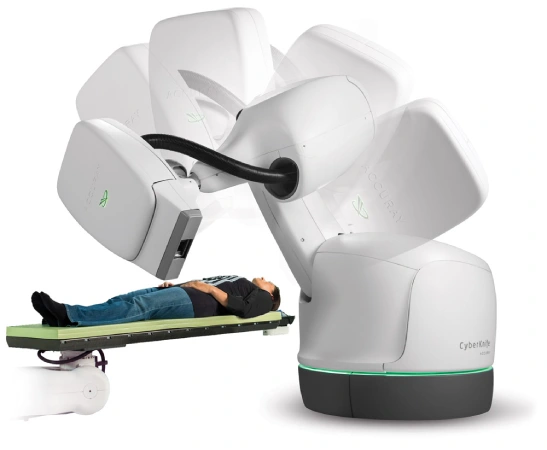When it comes to treating tumors and complex medical conditions, precision and minimal invasiveness are crucial. Cyber knife radiosurgery in Mumbai has emerged as a groundbreaking technology that provides non-invasive, highly accurate radiation therapy to treat cancerous and non-cancerous tumors. This robotic radiosurgery system eliminates the need for traditional surgery, ensuring faster recovery and minimal side effects. Patients seeking advanced treatment options can benefit immensely from CyberKnife operations performed by top specialists in India.

What is Cyber knife radiosurgery Operation?
CyberKnife is an advanced, robotic radiation therapy system designed to target and destroy tumors without incisions. It uses high-dose radiation beams to precisely target abnormal tissues, making it an excellent alternative to traditional surgery.
How Does CyberKnife Differ from Traditional Surgery?
Unlike conventional surgery, CyberKnife is:
- Non-invasive: No cuts, stitches, or hospital stays required.
- Highly precise: Targets only the tumor while sparing healthy tissue.
- Pain-free: No anesthesia or recovery downtime needed.
- Effective for hard-to-reach tumors: Ideal for brain, spine, lung, and prostate cancers.
What Conditions Can Be Treated with Cyber knife radiosurgery?
CyberKnife is used for various medical conditions, including:
- Brain tumors (both benign and malignant)
- Spinal tumors
- Lung cancer
- Prostate cancer
- Liver and pancreatic tumors
- Recurrent or inoperable cancers
Which Types of Brain & Spine Tumors Can Be Treated with CyberKnife?
CyberKnife is highly effective in treating a wide range of tumors, including:
- Brain Tumors: Meningiomas, gliomas, pituitary adenomas, and brain metastases.
- Spinal Tumors: Spinal metastases, primary spinal cord tumors, and schwannomas.
- Other Conditions: Arteriovenous malformations (AVMs), trigeminal neuralgia, and certain functional disorders.
Its ability to target tumors close to critical structures makes it an ideal option for complex cases.
What Tumor Sizes Are Suitable for CyberKnife Treatment?
CyberKnife is most effective for small to medium-sized tumors, typically up to 5 cm in diameter. However, larger tumors can also be treated by fractionating radiation over multiple sessions, allowing for safer and more effective dose delivery.
It is particularly beneficial for tumors deep inside the brain or spinal cord, where traditional surgery poses high risks.
How Does CyberKnife Eliminate Tumors Without Surgery?
Unlike conventional surgery, CyberKnife does not require any incisions or anesthesia. Instead, it uses:
- High-Dose Focused Radiation: Directly targets tumor cells while sparing healthy tissue.
Real-Time Image - Guidance: Continuously tracks tumor movement to ensure accuracy.
- Robotic Precision: Adjusts to even slight patient movements, eliminating the need for immobilization.
This method destroys tumor cells gradually, leading to their shrinkage or complete elimination without surgical intervention.
Can CyberKnife Be Used for Inoperable or High-Risk Tumors?
Yes, CyberKnife is a game-changer for inoperable tumors and those located in sensitive or surgically complex areas. It is ideal for:
- Patients who are unfit for surgery due to age or medical conditions.
- Tumors near vital nerves, blood vessels, or the brainstem, where surgery could cause serious complications.
- Recurrent tumors where previous surgery or radiation has already been performed.
It provides a safe and effective alternative when traditional surgery is not an option.
What Are the Advantages of Cyber knife radiosurgery Over Traditional Surgery?
CyberKnife offers several benefits, making it a preferred choice for many patients:
- Non-Invasive – No cuts, stitches, or anesthesia required.
- Outpatient Procedure – Typically completed in 1 to 5 sessions, avoiding hospital stays.
- Minimal Side Effects – Lower risk of complications compared to open surgery.
- Faster Recovery – Patients can return to daily activities almost immediately.
- High Precision – Reduces damage to surrounding healthy tissues, especially in sensitive brain and spinal areas.
Is CyberKnife Safe and FDA Approved?
Yes, CyberKnife is FDA-approved and has been successfully used for over two decades. It offers a safe and effective treatment option with well-documented clinical success.
How is a CyberKnife Treatment Session Performed?
The procedure involves:
Initial Consultation: A specialist evaluates the patient’s medical condition.
- Imaging & Planning: MRI or CT scans help create a customized treatment plan.
- Treatment Sessions: The robotic system delivers radiation beams accurately to the tumor site.
- Post-Treatment Monitoring: Patients return for follow-ups to assess treatment effectiveness.
What are the Costs of CyberKnife Operation in India?
The cost varies based on tumor location, hospital reputation, and specialist expertise. On average:
- Brain tumor treatment: INR 3-6 lakh
- Prostate or lung cancer treatment: INR 4-7 lakh
- Spine or pancreatic cancer: INR 5-8 lakh
How Effective is CyberKnife Compared to Other Treatments?
CyberKnife is often compared with traditional radiation therapy and surgery. Studies show it provides:
- Comparable survival rates to surgery for early-stage cancers.
- Higher precision and fewer side effects than conventional radiation therapy.
- Minimal lifestyle disruptions with fewer sessions and no hospitalization.
Who is One of the Best Cyber knife radiosurgery Specialists in India?
For expert Cyber knife radiosurgery in Mumbai, India, Dr. Manish Baldia is a highly trusted name in India. With vast experience in robotic radiosurgery, he has successfully treated numerous patients with advanced CyberKnife technology, offering world-class, non-invasive treatment options.
The CyberKnife operation is revolutionizing cancer treatment with its non-invasive, high-precision approach. Whether treating brain tumors or spinal conditions, this technology offers a safer, more effective alternative to surgery. Under the expertise of specialists like Dr. Manish Baldia, patients can access top-tier CyberKnife treatment, ensuring optimal recovery and improved quality of life.






